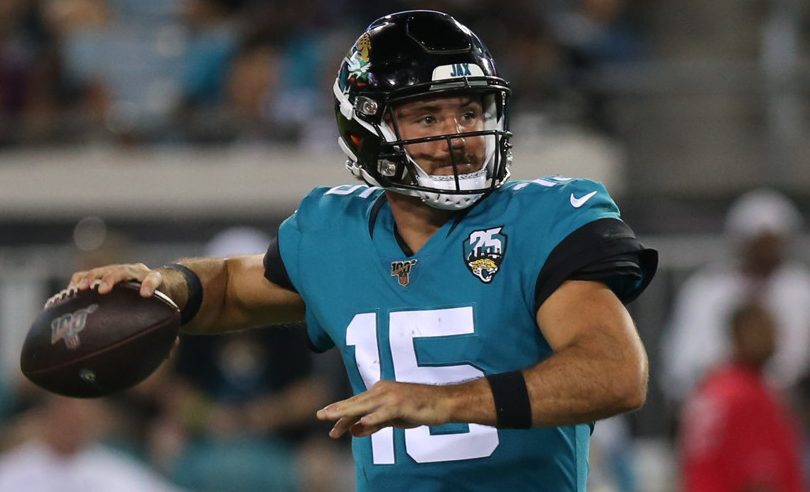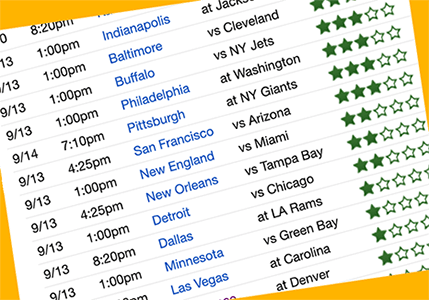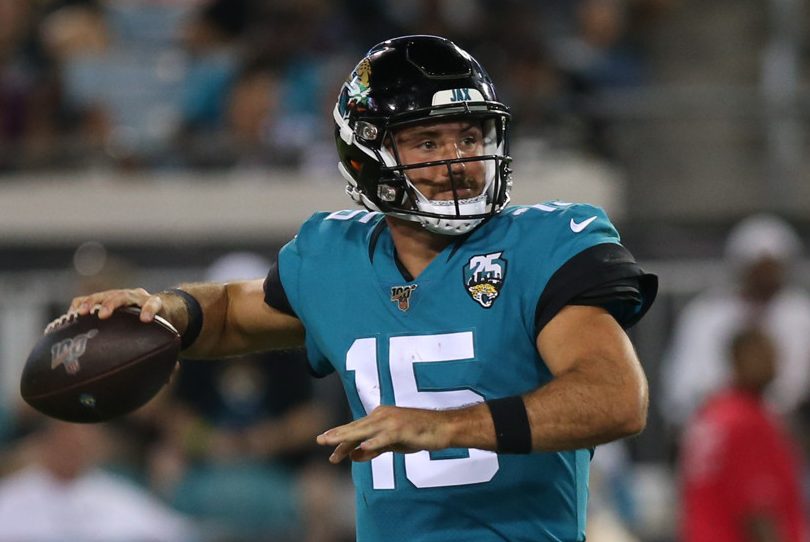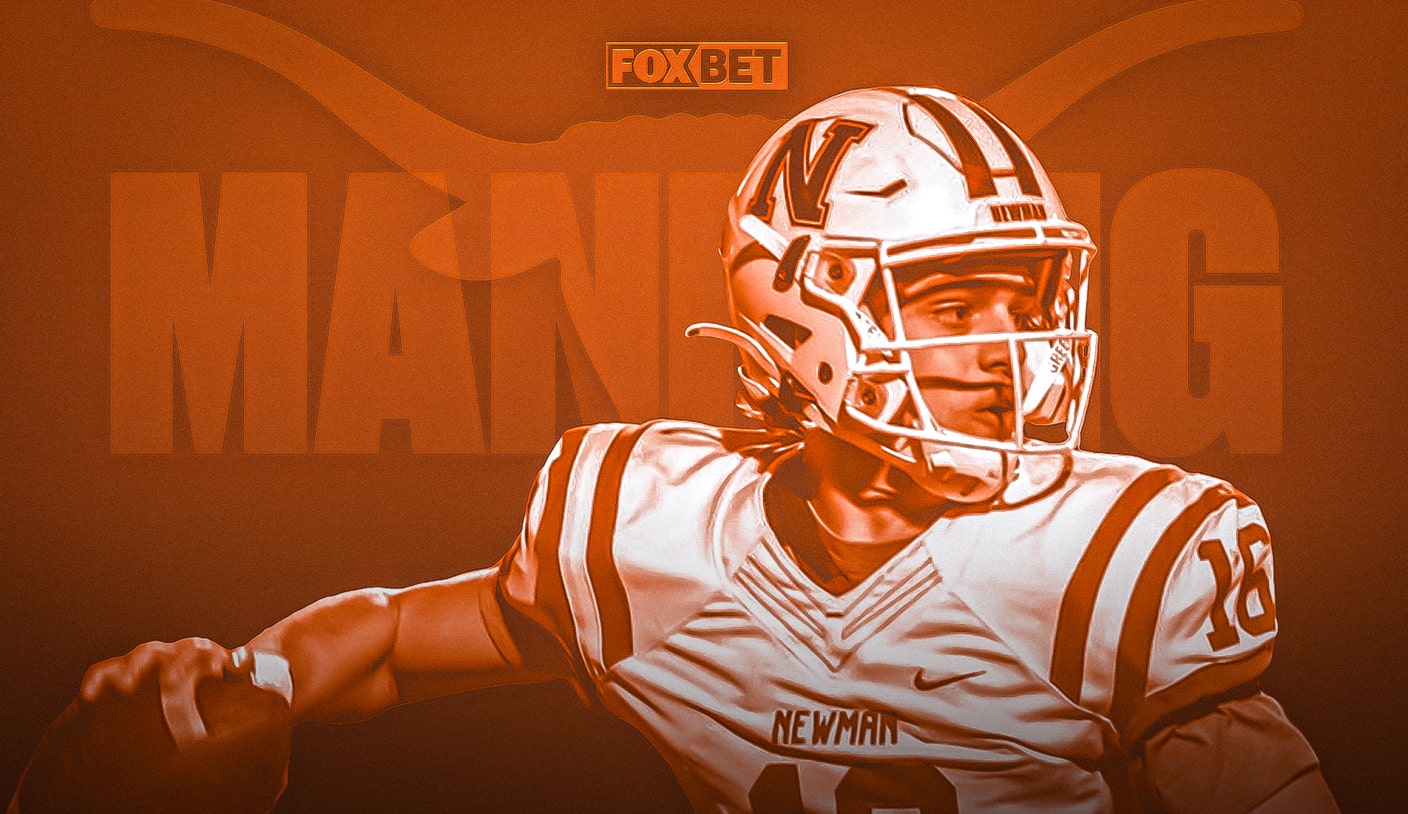NFL Betting Analysis: How First-Time Starting Quarterbacks Impact Point Spreads
September 13, 2019 – by Jason Lisk

Gardner Minshew will be making his first career start against the Houston Texans (Photo by David Rosenblum/Icon Sportswire)
Do games with backup quarterbacks making their first career start show higher variance than other NFL games? The quality and experience level of NFL backup quarterbacks can vary greatly, from veterans with a long history of starting, to journeymen, to relative unknowns.
This week, Gardner Minshew of the Jacksonville Jaguars, a rookie sixth-round pick, will be the latest to make his first career start at quarterback after a Week 1 injury to starter Nick Foles.
You can see the full game odds info on our Jacksonville-Houston matchup page. The preseason look-ahead line for this matchup was Houston -3.5. After the Foles injury, the Week 2 point spread opened at several books at Houston -8.5.
In the last two years, we’ve seen some extremes when an unknown backup was elevated to starter. Last season, Nick Mullens of the San Francisco 49ers shocked the Oakland Raiders with a 31-point victory in his first career start. Conversely, Buffalo turned to Nathan Peterman in 2017, and the result was a 56-10 loss.
But those are just two extreme cases. What does more data show?

NFL Week 1 Picks
Content:
ToggleBetting – Survivor – Pick’em
Start Free TrialGet The Season
Variance In Against-The-Spread Margins for First Career Starts by Backups
Over the last decade, 66 quarterbacks not drafted in the first round have made at least one NFL start.
If you exclude QB’s that opened the season as the starter (which includes guys like Andy Dalton, Russell Wilson, and Dak Prescott), that list shrinks to 58 non-first-rounders who made their debut start at some point during a season. The average point spread in those games was +5.5 points, with only 10 of the teams with a first-time starter being favored. Those teams went 26-31-1 ATS in the starting debuts. The games went over the point total 30 times and under 28 times.
To test whether these “first career start” games had higher variance than others, we looked at the closing point spreads and final game scores, to get the absolute value difference between the two. (“First career start” data is from Pro Football Reference, and you can use our Custom NFL Betting Trends tool to find spread and score data.)
As an example of how the data was compiled, if a team was favored by 3 points and won by 13, that would show an absolute value difference of 10 points from the spread. The same would be true if they lost by 7 points.
The Results
The average difference between final score and closing point spread for all games from 2009-2018 was 10.4 points.The average difference between final score and closing spread for our 58 “first career start by backup” games was 12.4 points.12.6% of all games finished at least 21 points from the spread, compared to 19.0% for all of the “first career start by backup” games.28.6% of all games finished at least 14 points away from the spread, compared to 39.7% for all of the “first career start by backup” games.
So on average, games from rookie QB’s getting their first start mid-season indeed seem “less predictable” using point spreads as the measure. Since 2009, outcomes where the final margin of victory was off 21 points or more from what the point spread implied happened around 50% more often than average.
But What About Wins?
In theory, higher variance games would be a slightly negative factor if you were wanting to back the money line favorite, and good if you supported the underdog, when comparing two money line options at the same point spread.
The chances of pulling an upset should be slightly higher if there was more variance in outcomes. This is why, for example, we see that money lines in college and the NFL do not match up for games with the same point spread.
This week, for example, Baltimore has implied win odds of about 85% as a 13-point favorite in NFL Week 2, with a -667 money line. (You can see the money line and other betting information on our Cardinals-Ravens matchup page.) Meanwhile, on the college side, Nebraska and Oklahoma State were both 13.5-point favorites, but with money lines of -530 and -518, respectively, implying win odds of around 82% and 81%.
That’s the theory, at least. But how did the actual game results go for our higher variance “new starter” games?
You would have expected 19.6 wins (out of 58 games) based on the implied win odds from the money lines for each of those games.
But the actual win total was 17 wins from the group, slightly below what you would expect.
Close Game Performance and Backups Making Their First Career Start
So how do we get a situation where games with a first-time starting quarterback exhibit higher expected scoring margin variance than other games, yet those first-time QB’s win less frequently than you would expect, as mostly underdogs?
The answer is performance is close games. The teams with the new starting quarterback were just 6-13 in games decided by eight points or less. That includes an 0-6 record in games decided by exactly a field goal.
Surprisingly, the first-time starters had a higher win percentage in games decided by more than two touchdowns (8-12 SU) than in games decided by eight points or less.
Is this just bad luck, or the result of a lack of NFL game experience? There could be an argument for both given the small sample size, as the first-time starters might be at a disadvantage compared to veterans when it comes to game management and other skills necessary to succeed in late game situations.
So we can’t just chalk it up to bad luck, but we can’t rule out that possibility either.
Summary
To wrap up, here’s what we found:
Since 2009, games involving first-time starting QBs who were not drafted in the first round, and weren’t their team’s opening game starter entering the year, do show higher variance in terms of margin against the spread. In other words, the final score margin is more likely to be way off the point spread (in either direction) than other games that don’t meet this criteria.The teams with first-time starters did not win as many games as expected, despite that higher variance and despite mostly being underdogs. That is a counter-intuitive result.This overall underperformance in terms of win percentage is driven by an especially poor record in close games. That could be just bad luck that will even out in time, but a plausible causation theory also exists, since first-time starters lack NFL game experience.
If you’re in an NFL pool or betting the games, check out our NFL Survivor Picks, Football Pick’em Picks, and NFL Betting Picks.

NFL Week 1 Picks
Betting – Survivor – Pick’em
Start Free TrialGet The Season
If you liked this post, please share it. Thank you! Twitter Facebook
NFL Football Pool Picks NFL Survivor Pool Picks NCAA Bracket Picks College Bowl Pool Picks College Football Pool Picks NFL Picks NBA Picks MLB Picks College Football Picks College Basketball Picks NFL Predictions NBA Predictions MLB Predictions College Football Predictions College Basketball Predictions NFL Spread Picks NBA Spread Picks MLB Spread Picks College Football Spread Picks College Basketball Spread Picks NFL Rankings NBA Rankings MLB Rankings College Football Rankings College Basketball Rankings NFL Stats NBA Stats MLB Stats College Football Stats College Basketball Stats NFL Odds NBA Odds MLB Odds College Football Odds College Basketball Odds A product ofTeamRankings BlogAboutTeamJobsContact
© 2005-2024 Team Rankings, LLC. All Rights Reserved. Statistical data provided by Gracenote.
TeamRankings.com is not affiliated with the National Collegiate Athletic Association (NCAA®) or March Madness Athletic Association, neither of which has supplied, reviewed, approved or endorsed the material on this site. TeamRankings.com is solely responsible for this site but makes no guarantee about the accuracy or completeness of the information herein.
Terms of ServicePrivacy Policy



